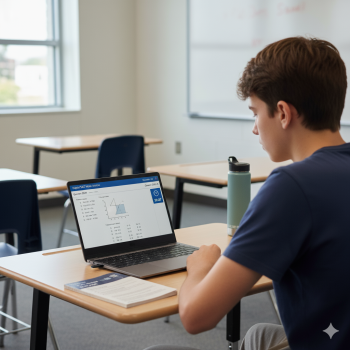Understanding Khalifa University and Where the SAT Fits
Khalifa University (KU) in the United Arab Emirates is one of the region’s leading research-intensive institutions. If you’re an international student — or a student in the UAE planning to apply — you’re probably wondering how the Digital SAT (the newer, computer-based SAT) fits into KU’s admissions picture. The short answer: the SAT can be a useful credential in the application, but admissions decisions also consider grades, recommendation letters, personal statements, and subject-specific requirements.

Why the SAT still matters
Universities like Khalifa emphasize academic readiness and potential for research. The SAT gives a standardized snapshot of a student’s critical reading, math reasoning, and overall problem-solving ability — especially valuable when applicants come from diverse curricula worldwide. For many applicants, a strong SAT score can strengthen an application where transcripts are hard to compare internationally.
What Applicants Usually Need to Know
Admissions policies do change, so treat the following as practical, experience-based guidance rather than an exact, policy-level citation. Before you apply, always confirm details on Khalifa University’s official admissions pages or by contacting their admissions office. That said, here’s what students generally need to prepare:
- Proof of secondary education completion (high school diploma or equivalent)
- Official transcripts and grade reports
- Standardized test scores — often SAT/ACT for international applicants
- English proficiency evidence (IELTS, TOEFL, or sometimes waived with strong SAT Evidence-Based Reading & Writing scores)
- Letters of recommendation and a personal statement or essay
- Any program-specific requirements (e.g., portfolios, math/science subject evidence)
Digital SAT vs. Traditional SAT
The Digital SAT is a shorter, adaptive, computer-based test focused on clarity and accessibility. If you’re preparing for the Digital SAT, plan your practice around digital testing conditions: time management on a screen, navigating adaptive sections, and practicing with official digital practice tools where possible. Many admissions offices accept the Digital SAT just as they accepted the previous paper-based version — but always verify whether Khalifa lists specific formats they accept.
Score Expectations — How High Should You Aim?
Instead of promising a single cutoff score, a more helpful approach is to think in ranges tied to competitiveness and program selectivity.
| Applicant Goal | Suggested SAT Approach | Why this matters |
|---|---|---|
| Safeguard / Baseline | A solid, well-rounded score that aligns with your school’s average | Helps meet general admissions expectations and supports your transcript. |
| Competitive | A higher score that demonstrates academic strength in math and evidence-based reading | Improves chances for competitive engineering and science programs. |
| Standout | Top-quartile score that distinguishes you from typical applicants | Can boost scholarship eligibility and signal strong readiness for research-intensive tracks. |
Because KU’s undergraduate programs are competitive — particularly engineering, computer science, and research-focused tracks — students should treat the SAT as an opportunity to stand out, especially if their school grading scale is difficult for international admissions committees to interpret. If English is not your first language, a strong Evidence-Based Reading & Writing performance on the SAT can sometimes help demonstrate proficiency alongside or in lieu of other tests.
English Language Requirements
Many UAE universities expect proof of English proficiency if your prior instruction wasn’t in English. Common ways to satisfy that requirement include IELTS, TOEFL, or strong performance on sections of the SAT that measure reading and writing. If you’re relying on SAT scores to demonstrate English ability, be sure to verify whether Khalifa specifically accepts the SAT for this purpose and what score range they consider sufficient.
Practical tip
If your high school curriculum was English-medium, prepare to include a school letter or transcript that states the language of instruction. Admissions offices often accept that alongside standardized test scores as confirmation.
Application Components Where the SAT Helps Most
The SAT is more than a number — when used well, it complements your academic record and strengthens specific parts of the application:
- Contextualizing grades from unfamiliar curricula (international AP, IB, national systems)
- Demonstrating readiness for math- and science-heavy majors
- Supporting scholarship or honors program applications
- Providing evidence of English reading and writing ability
Example: Two applicants with different strengths
Student A attends a rigorous national curriculum and has excellent grades, but the grading scale isn’t familiar to KU’s admissions team. A strong SAT score helps the admissions evaluators compare Student A’s readiness to international peers. Student B has good grades but weaker writing samples; a high Evidence-Based Reading & Writing score on the SAT can reassure evaluators about Student B’s ability to handle English-based coursework.

Preparing the Best SAT Application Strategy
A thoughtful plan turns the SAT from a stress point into an advantage. Here’s a step-by-step roadmap students and parents can follow:
- Research: Confirm current Khalifa University requirements directly with the admissions office before investing in a particular test date or prep approach.
- Baseline testing: Take a practice Digital SAT early to identify strengths and weaknesses.
- Set a target score: Be realistic but ambitious — aim for a score that strengthens your application, not just one that “meets minimums.”
- Create a study plan: Combine content review, regular practice tests, and timed sections to build endurance and strategy.
- Document strategy: Make sure you have high-quality transcripts, a crisp personal statement, and strong recommendation letters to complement your SAT scores.
How parents can help
Supportive parents do more than pay for prep — they help manage logistics, celebrate progress, and keep stress levels reasonable. Offer structured study time, help schedule test dates, and encourage breaks. Emotional support matters as much as any study schedule.
Study Resources and the Role of Personalized Tutoring
Study resources should match your learning style. Solo learners may thrive with official practice tests and digital practice tools, while many students benefit from human guidance. A hybrid approach — self-study plus targeted tutoring — often delivers the best results.
Why personalized tutoring helps
Personal tutoring tailors instruction to a student’s unique gaps: targeted math coaching, reading strategies for complex passages, or timing practice specific to the Digital SAT’s adaptive format. If you’re balancing schoolwork, extracurriculars, and a competitive application timeline, personalized, one-on-one guidance can accelerate progress and keep you on schedule.
One example of a tailored approach is Sparkl’s personalized tutoring: they offer 1-on-1 guidance, tailored study plans, expert tutors, and AI-driven insights that refine the study plan as the student improves. That mix of human attention and data-driven direction can be especially useful for students aiming for competitive STEM programs at institutions like Khalifa University.
Practical Test-Day and Logistics Advice for UAE Applicants
Even though the SAT is now often administered digitally, the basics of good test-day preparation remain constant. Plan ahead for the following:
- Test registration deadlines and available test centers in the UAE or nearest international location.
- Identification documents required on test day — carry originals and photocopies as backups.
- Digital test practice: get comfortable with a multi-hour session on a laptop or tablet in a quiet environment.
- Rest, nutrition, and timing: practice under timed conditions to simulate fatigue and pacing.
Sending scores to Khalifa University
When you receive your scores, follow Khalifa’s instructions for official score submission. Most universities accept official score reports sent by the testing agency. If you’re unsure whether to send both digital and paper-era scores, check with the admissions office directly to avoid unnecessary confusion.
Scholarships and Merit Considerations
Strong standardized scores can sometimes strengthen scholarship applications. If you’re aiming for merit-based aid or program-specific funding at Khalifa University, a standout SAT performance combined with strong academics and extracurricular achievements may improve your case. Again, scholarship criteria evolve, so confirm specific thresholds and application processes with the KU scholarships or financial aid office.
Common Applicant Questions — Answered
Q: Do I need the SAT to apply to Khalifa University?
A: Not always. Some applicants may be able to apply with other qualifications (ACT, IB, A-Levels, or national credentials). The SAT remains a useful option for many international applicants. Confirm directly with KU for your country and program.
Q: What if English isn’t my first language?
A: Provide the standard English proficiency scores requested by Khalifa University, or check if a strong SAT EBRW score can help supplement that requirement. If in doubt, include both the SAT and a recognized English test to avoid delays in the admissions review.
Q: Can a high SAT score substitute for weaker school grades?
A: A high SAT score can strengthen an application and provide context for strong academic potential, but it rarely fully substitutes for consistent academic performance. Admissions teams prefer a balanced profile: reliable grades, demonstrated interest in the chosen field, meaningful extracurriculars, and solid standardized test performance.
Checklist: Before You Submit Your Khalifa University Application
- Confirm program-specific entry requirements for the year you’re applying.
- Take an official Digital SAT practice test and set realistic target scores.
- Prepare and order official transcripts well in advance.
- Arrange for official score reporting through the testing agency as required.
- Draft and revise your personal statement; gather recommendations early.
- If you need extra support, consider a focused tutoring plan to polish weak areas.
Putting It All Together: A Realistic Timeline
Apply backward from your application deadline. Here’s a compact timeline you can adapt:
- 6–12 months before deadline: Take a full practice Digital SAT, gather transcript requirements, and plan test dates.
- 4–8 months before deadline: Begin targeted prep (content review, timed practice, and at least one full practice test per month).
- 2–4 months before deadline: Finalize test date(s), take a full official practice under test conditions, and schedule any retakes if needed.
- 1–2 months before deadline: Assemble application materials, request transcripts and recommendations, and ensure official scores will be sent on time.
How tutoring fits into the timeline
If you choose 1-on-1 tutoring, start early enough that the tutor can diagnose gaps and track measurable improvement across at least 8–12 weeks. Programs like Sparkl can provide tailored study plans and AI-driven progress checks that help keep the timeline realistic and targeted.
Final Thoughts: Make Your Application Reflect You
The SAT is an important tool but not the whole story. Khalifa University — like many competitive institutions — evaluates applicants holistically. Use the SAT to showcase your readiness: demonstrate problem-solving, analytical thinking, and clear written communication. Pair that with thoughtful essays, strong recommendations, and a transcript that highlights your best work.
Above all, approach the process as a journey. With a clear plan, targeted practice, and the right support — whether through structured self-study or personalized tutoring — you can present an application to Khalifa University that feels authentic, well-prepared, and competitive.
Good luck, and remember: preparation coupled with calm, confident execution is the best way to make your application shine.
Note: Admissions policies and test acceptance criteria change periodically. Before submitting an application, confirm the latest requirements directly with Khalifa University’s admissions office or official admissions webpage.















No Comments
Leave a comment Cancel